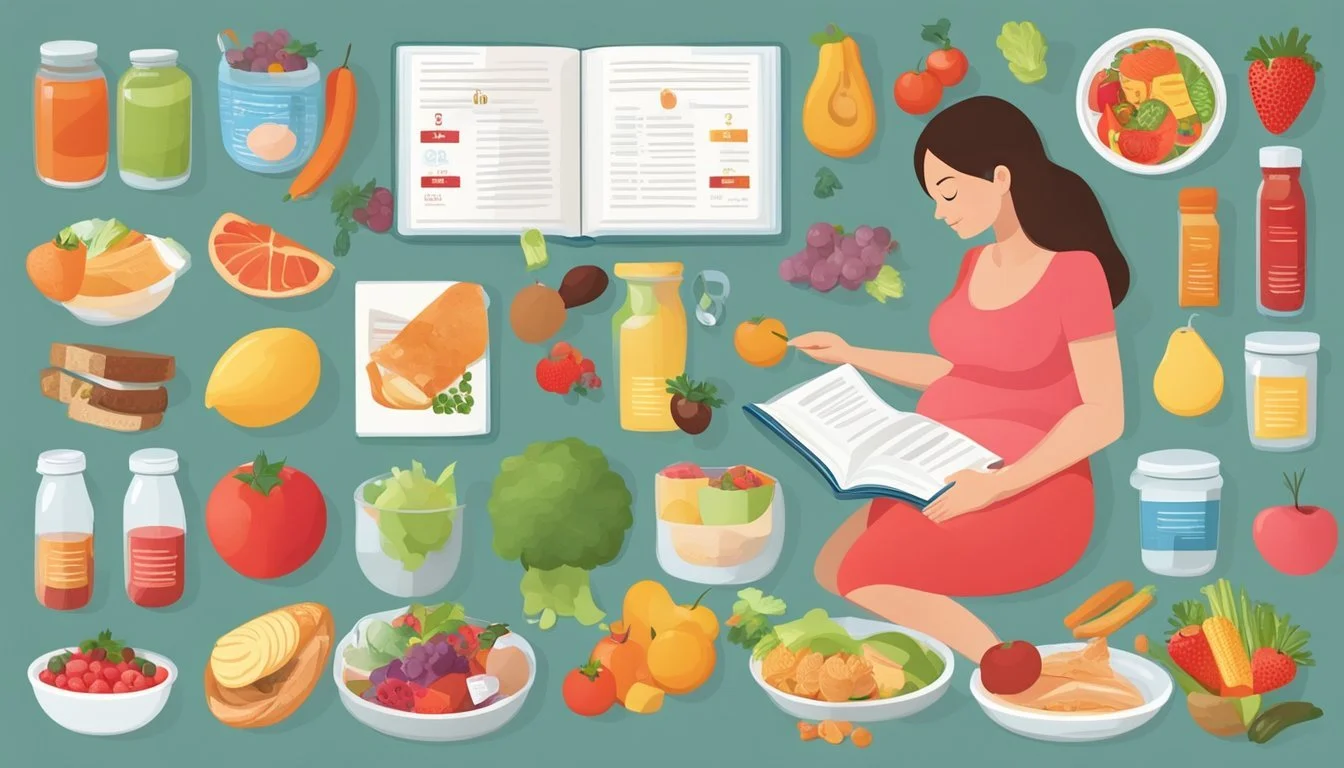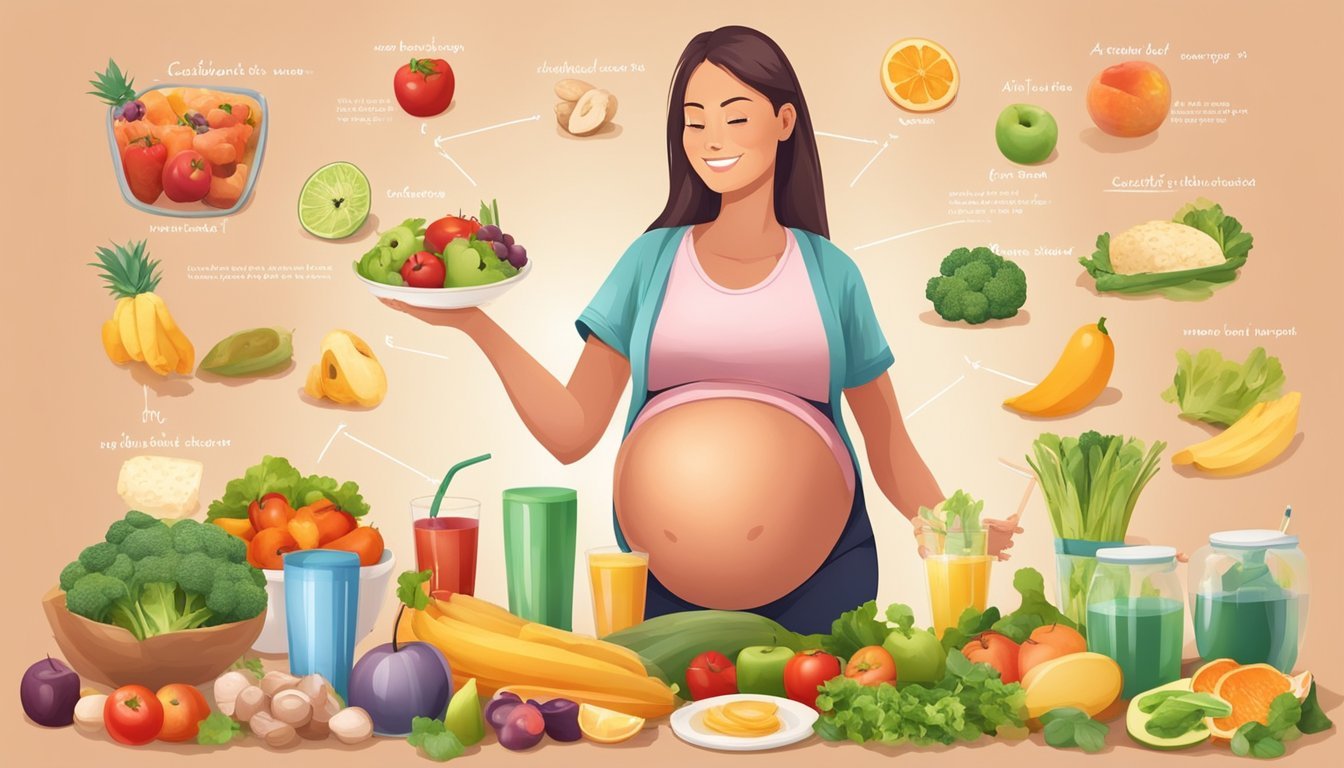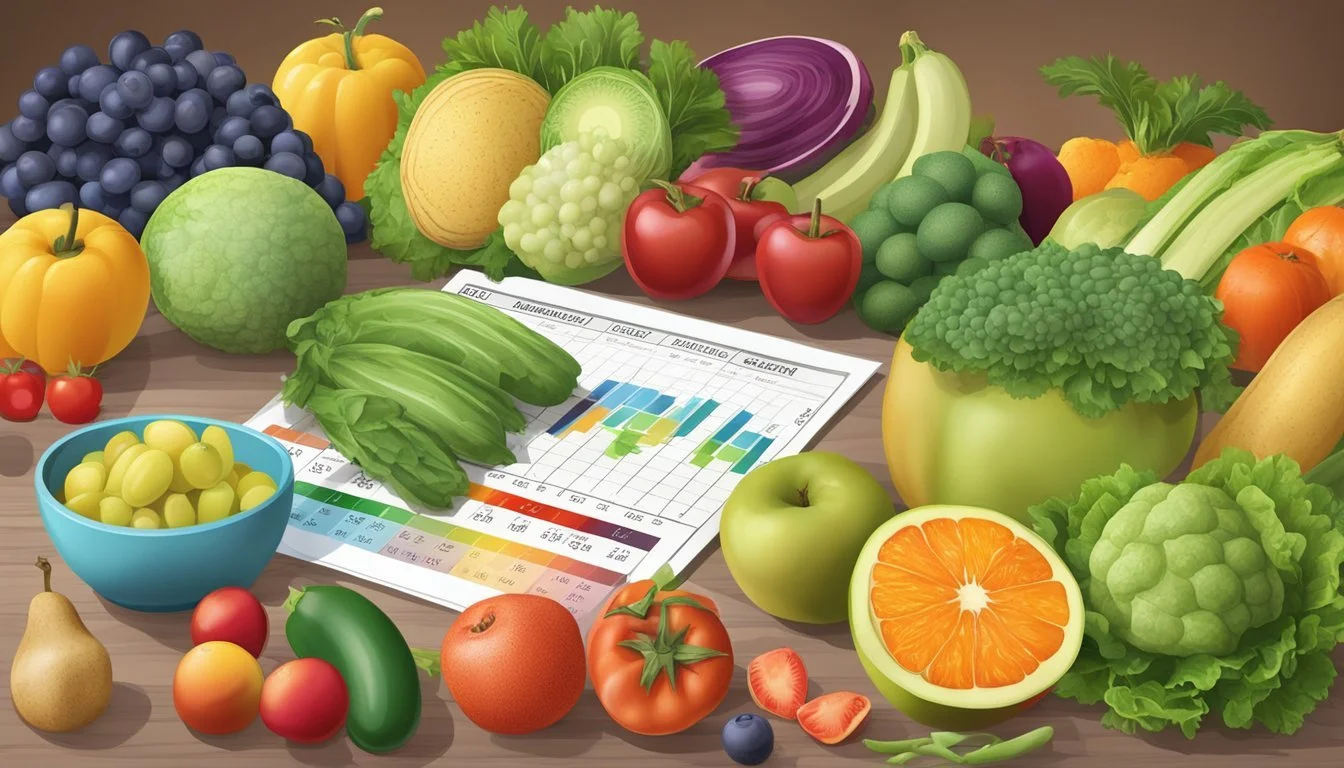Is It Safe to Follow the Blood Type Diet During Pregnancy?
Exploring Nutritional Guidelines
The blood type diet, popularized by the best-selling book "Eat Right 4 Your Type," suggests that one's diet should be tailored to one's blood type (O, A, B, or AB) to improve health and decrease the risk of chronic diseases. It has provoked interest and debate among health enthusiasts. However, when it comes to pregnancy, a woman's nutritional needs take on heightened importance, as they affect not just her own health but also the development and well-being of her baby.
During pregnancy, the primary focus of dietary recommendations is to ensure that the expecting mother receives adequate nutrition to support the growth and development of the fetus and to maintain the mother’s health. Health professionals emphasize the importance of a balanced diet that is rich in essential nutrients such as DHA, calcium, folic acid, and iron. These contribute to critical aspects of fetal development, including brain growth and blood volume expansion.
Following a prescriptive diet like the blood type diet may result in the exclusion of certain food groups, which has the potential to lead to nutritional deficiencies that could compromise fetal health. Accordingly, healthcare providers generally do not recommend restrictive diets, like the blood type diet, during pregnancy. Instead, they advocate for a well-rounded diet that is based on current evidence-based nutritional guidelines to ensure both mother and child receive the full spectrum of necessary nutrients.
Understanding the Blood Type Diet
The Blood Type Diet aligns dietary recommendations with an individual's blood type. Its application during pregnancy requires careful consideration to ensure nutritional adequacy.
Origins and Principles of the Blood Type Diet
The Blood Type Diet, founded by Dr. Peter D'Adamo, postulates that people process food differently based on their blood type—O, A, B, or AB. Each blood type is believed to have its own distinct ancestral heritage and optimal diet. For example, type O is thought to benefit from high proteins and fewer carbohydrates, mimicking ancestral hunter-gatherer diets, while type A is recommended a more plant-based diet with less focus on meat and dairy consumption.
The guidelines suggest specific foods to avoid and embrace for each blood type on the premise that this can improve health and lower disease risk. The table below summarizes key dietary components for each blood type:
Blood Type Foods to Emphasize Foods to Avoid O High-protein foods like meat, fish; certain vegetables; limited grains Grains, legumes, dairy A Vegetables, tofu, seafood; certain grains acceptable Meat, dairy, kidney beans, lima beans B Balanced omnivore diet - lean meat, dairy, grains; certain vegetables Corn, peanuts, sesame seeds, wheat AB Combination diet - seafood, tofu, dairy, some meat, grains, and vegetables Red meat, kidney beans, buckwheat, corn, wheat
Adapting the Blood Type Diet for Pregnancy
During pregnancy, adapting any diet should be done with increased attention to nutritional balance and the needs of the developing fetus. It's critical that any adaptations of the Blood Type Diet meet the elevated demand for protein, iron, and essential vitamins, while maintaining a varied intake of carbohydrates for energy. The focus should be on the inclusion of nutrient-dense foods and the elimination of processed foods and those that pose allergenic risks or no nutritional benefit.
Restricting certain food groups as dictated by the Blood Type Diet might create challenges for obtaining all critical nutrients. For instance, if a pregnant woman with type A blood were to strictly avoid all animal proteins as suggested, she might need alternative sources of iron and vitamin B12, which are crucial during pregnancy. It is advisable for pregnant women considering this diet to consult healthcare professionals to ensure a balanced diet that supports both maternal and fetal health.
Nutritional Needs During Pregnancy
Pregnant individuals require a carefully considered balance of macronutrients and micronutrients to support their health and the development of the fetus. Specific vitamins and minerals are crucial for fetal growth and need to be adequately provided through diet and supplementation.
Macronutrients and Micronutrients
Macronutrients are required in large quantities during pregnancy, as they provide the necessary energy and support overall growth and function.
Protein: It is vital for the development of fetal tissue, including the brain, and the growth of breast and uterine tissue. Pregnant women should aim for 75 to 100 grams of protein per day.
Fiber: Adequate fiber intake can help prevent common pregnancy-related issues such as constipation and hemorrhoids. Women should include fiber-rich foods such as fruits, vegetables, and whole grains in their diet.
Micronutrients, although required in smaller amounts, are equally important.
Calcium: Important for building the baby's bones and teeth, as well as supporting the mother's circulatory, muscular, and nervous systems. Recommended daily intake is around 1000 milligrams.
Iron: Plays a critical role in the production of hemoglobin and helps both the mother and baby's blood carry more oxygen. The iron requirement increases to about 27 milligrams per day during pregnancy.
Vitamins and Minerals for Fetal Development
Vitamins and minerals are key players in fetal development and maternal well-being.
Folate (or Folic Acid): Essential for reducing the risk of neural tube defects. Pregnant women are advised to have 600 micrograms daily.
Vitamin D: This vitamin is important for immune function and bone health, with the recommended intake being 600 IU per day.
Certain prenatal vitamins are recommended to ensure the intake of essential nutrients when dietary sources might be insufficient. These supplements are typically started at least three months before conception and continued throughout pregnancy.
Safe Eating Habits in Pregnancy
Proper nutrition during pregnancy is essential for the health of both the expecting mother and the baby. Integrating a balance of proteins, carbohydrates, and fats from a variety of food groups, while avoiding harmful substances, supports fetal development and maternal well-being.
Foods to Embrace
Fruits and Vegetables: A rich source of vitamins, minerals, and fiber, pregnant individuals should aim for a variety of colorful fruits and vegetables. They should consider including:
Oranges
Berries
Leafy greens
Carrots
Whole Grains: Whole grains provide essential carbohydrates and fiber, important for energy and digestion. Suitable options include:
Quinoa
Brown rice
Oatmeal
Lean Proteins: Certain lean proteins are crucial for the baby's growth, especially for the development of muscles and brain tissue. Advisable choices are:
Chicken
Turkey
Lentils
Beans
Eggs: Packed with protein and choline, which is vital for brain development, they can be incorporated into various meals.
Nuts: They are great for snacking and add essential fatty acids and protein to the diet.
Fish: Fish contains omega-3 fatty acids, beneficial for fetal brain development. However, only certain types of fish that are low in mercury should be consumed in moderation.
Dairy Products: Dairy is an important source of calcium and protein. Options such as yogurt and milk are recommended.
Prenatal Vitamins: While not a food group, these supplements are critical to cover any nutritional gaps, particularly folic acid, which helps prevent neural tube defects.
Foods to Avoid and Limitations
Certain foods and substances possess potential risks and therefore, should be limited or avoided:
Alcohol: Completely avoid alcohol as it can lead to developmental issues.
High-Mercury Fish: Steer clear from fish like swordfish and king mackerel.
Unpasteurized Dairy and Juices: These can carry harmful bacteria.
Raw or Undercooked Meats: Including sushi, to prevent the risk of infection.
Excessive Caffeine: Limit intake as high amounts can lead to complications.
Understanding Portion Sizes and Frequency
Regular Meals: Eating small, regular meals can help maintain stable blood sugar levels and alleviate common pregnancy discomforts like nausea and heartburn.
Portion Sizes:
Proteins: 5-6.5 ounces per day
Fruits: 2 cups per day
Vegetables: 2-3 cups per day
Grains: 6-8 ounces per day; at least half should be whole grains
Dairy: 3 cups per day
Balancing nutrient intake with appropriate portion sizes promotes optimal health and prevents excessive weight gain during pregnancy.
Risks and Considerations
When considering the blood type diet during pregnancy, one must carefully evaluate potential nutritional gaps and ensure adequate weight gain and nutrient intake for fetal development.
Potential Shortcomings of Diet Restrictions
The blood type diet often imposes restrictions that could limit the consumption of certain food groups. For example, it may suggest that individuals with type A blood follow a mostly vegetarian diet, which might lead to insufficient protein intake if not well managed. Gestational diabetes requires consistent monitoring from a healthcare professional, typically following guidelines from the American Diabetes Association. Adhering strictly to diet restrictions based on blood type without professional consultation might not align with diabetes care recommendations, potentially impacting blood sugar control.
Key Concerns:
Incomplete protein sources
Insufficient diabetes care adherence
Monitoring Weight and Nutrient Intake
Maintaining appropriate weight gain during pregnancy is essential. The blood type diet could potentially lead to either insufficient or excessive weight gain, depending on its alignment with an individual's caloric and nutritional needs. It also raises concerns regarding the management of iron deficiency anemia, which is common during pregnancy. Expectant mothers require adequate iron to prevent anemia and to lower the risk of neural tube defects. Blood pressure management is another crucial aspect of a healthy pregnancy, and diet plays a significant role in this regard. It is vital that any diet plan during pregnancy, including one based on blood type, does not compromise the intake of essential nutrients.
Crucial Nutrients to Monitor:
Iron
Folic acid
Calories
Balanced macronutrients
Supplementation During Pregnancy
During pregnancy, the need for certain nutrients increases to support the health of the mother and the proper development of the fetus. The informed use of supplements can help fulfill these increased nutritional requirements.
When to Supplement
Pregnant individuals are commonly advised to begin folic acid supplementation before conception and continue during early pregnancy to reduce the risk of neural tube defects. Prenatal vitamins are typically recommended to ensure adequate intake of essential nutrients when dietary sources might not be sufficient.
Folic Acid: At least one month before conception
Iron: As prescribed by a healthcare provider to prevent anemia
DHA and Omega-3 Fatty Acids: Throughout pregnancy for fetal brain development
Choosing the Right Supplement
Selecting the appropriate prenatal supplement is crucial. It should contain a balanced mix of essential vitamins and minerals to support pregnancy.
Prenatal Vitamin: Should include adequate folic acid, iron, calcium, and vitamin D
DHA: An Omega-3 fatty acid, important for fetal brain development, often included in prenatal supplements
Supplements: Must be chosen based on individual dietary needs and doctor's advice
They should consult their healthcare provider to tailor supplementation to their needs, as over-supplementation can be harmful.
Special Dietary Needs and Pregnancy
During pregnancy, nutritional requirements are uniquely tailored to support both maternal health and fetal development. It's critical for pregnant women to consider their dietary needs, especially when adhering to specific dietary lifestyles or managing pre-existing health conditions.
Vegetarian and Vegan Considerations
Pregnant women following vegetarian or vegan diets should focus on obtaining a balanced intake of nutrients crucial for fetal growth and overall health. Key nutrients include:
Proteins: Essential building blocks for fetal tissue construction, including amino acids found in:
Legumes (beans, lentils)
Nuts and seeds
Soy products (tofu, tempeh)
Quinoa and other whole grains
Iron: Vital for oxygen transport in the blood, sourced from:
Spinach and other leafy greens
Fortified cereals and grains
Legumes
Calcium: Important for bone development, found in:
Fortified plant milks (soy, almond)
Fortified orange juice
Tofu
Bok choy and kale
Vitamin B12: Usually challenging to obtain from plant-based sources, therefore, might require supplementation or consuming fortified foods.
Ensuring the inclusion of complex carbohydrates in meals provides sustained energy, while also meeting higher calorie requirements during pregnancy.
Managing Pre-existing Conditions
For pregnant individuals with pre-existing conditions like gestational diabetes, nutritional management is crucial. They must prioritize:
Blood sugar control: Through a balanced diet that limits simple sugars and emphasizes complex carbohydrates for steadier blood glucose levels. Foods include:
Whole grains (oats, barley)
Beans and lentils
Non-starchy vegetables
Consistent carbohydrate intake throughout the day to maintain stable glucose levels.
Monitoring glycemic index: Choosing foods with a low glycemic index to help manage blood sugar charts.
Regular medical consultation is imperative to adapt diet plans and ensure appropriate nutritional intake while monitoring the condition.
These dietary modifications and careful planning are integral to ensuring a healthy pregnancy in the face of special dietary needs or chronic conditions.
Physical Activity and Dietary Balance
During pregnancy, maintaining a balance between physical activity and dietary intake is crucial for the health of both the mother and the developing fetus. Exercise is an essential component of a healthy pregnancy, offering benefits such as enhanced mood, better posture, and increased muscle tone and endurance. Engaging in regular, moderate activity can also improve sleep quality and energy levels.
A pregnant individual should focus on consuming a variety of nutrients to support exercise routines and fetal development. Calories should come from a diverse range of foods that include healthy fats and lean protein to ensure both mother and baby are receiving all necessary micronutrients. Healthy fats, like those found in avocados and olive oil, play a vital role in fetal growth, while lean proteins such as chicken breast, tofu, or beans, can help repair and build tissues.
The American College of Obstetricians and Gynecologists (ACOG) recommends at least 150 minutes of moderate-intensity aerobic activity per week for pregnant women, as long as there are no medical or obstetric complications. It is essential to consult with a healthcare provider to tailor an exercise regimen that suits individual health needs.
When it comes to dietary patterns, moderation and balance are key. Overly restrictive diets, including those based on blood type, may not provide all the necessary nutrients. Women should aim to consume a well-rounded diet, potentially incorporating aspects of the Mediterranean diet, which emphasizes fruits, vegetables, whole grains, and healthy fats, shown to be safe during pregnancy.
Exercise and diet during pregnancy should be approached with care. Regular physical activity, combined with intentional food choices, can contribute to optimal pregnancy outcomes and the long-term health of the mother and child.
Postpartum Nutrition
The transition from pregnancy to the postpartum period requires a woman's body to shift nutritional gears, particularly if she is breastfeeding. It's crucial for new mothers to focus on a diet that supports recovery and provides the energy needed for the added demands of nurturing a newborn.
From Pregnancy to Breastfeeding
Breastfeeding typically requires women to consume additional calories each day. An extra 500 calories are typically recommended to support lactation needs. It’s vital for mothers to not just increase their calorie intake, but to also be mindful of the right balance of nutrients.
Essential nutrients necessary during breastfeeding include:
Calcium: Vital for strong bones, recommended at about 1,000 mg per day.
Iron: Helps in increasing red blood cells and in energy production. Foods high in Vitamin C should be consumed alongside to enhance iron absorption.
Choline: Important for the baby's brain development, with higher requirements of 550 mg per day during lactation.
Protein: An additional 20 grams per day is beneficial to support tissue repair and growth.
Foods to include:
Dairy products or fortified plant milks for calcium
Lean meats, spinach, and legumes for iron
Eggs, meat, and some seafood for choline
Nuts, seeds, and lean meats for protein
Rebalancing Diet Post-Delivery
After delivery, the focus of a woman's diet should shift to support her own recovery while still accommodating the need to produce nutritious breast milk if she is nursing. This includes a balance of carbohydrates, proteins, and fats, along with a variety of vitamins and minerals to aid in the healing process and to ensure a robust milk supply.
A balanced post-delivery diet should include:
Complex Carbohydrates: For sustained energy, include whole grains, fruits, and vegetables.
Healthy Fats: Avocados, olive oil, and nuts can provide necessary fatty acids.
Hydration: Adequate fluid intake is essential, with an emphasis on water and reducing caffeinated beverages.
Moderation: While it's important to increase caloric intake, it must be done mindfully to avoid excessive weight gain.
Proper postpartum nutrition provides a foundation for long-term health, enabling new mothers to rebuild their strength and energy reserves.








